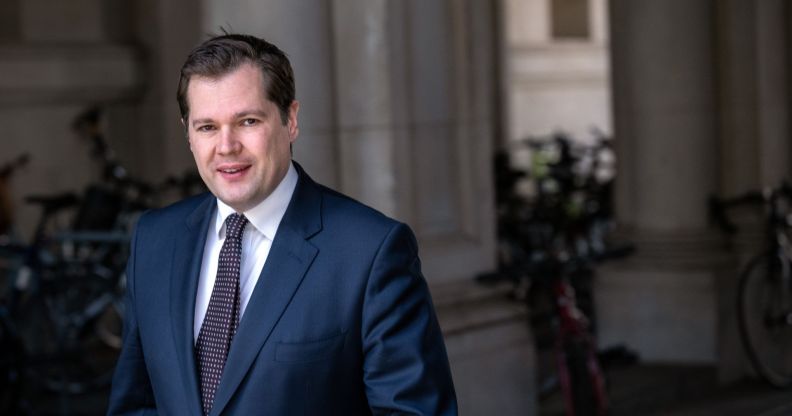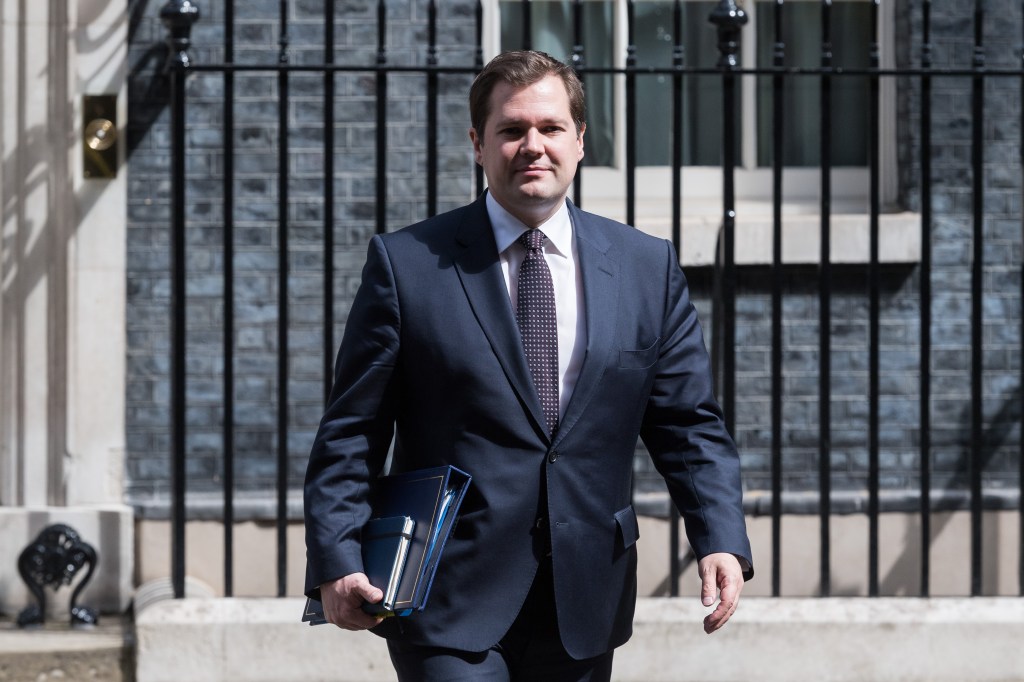How the ECHR has transformed LGBTQ+ rights in the UK, as Tories consider leaving it

Robert Jenrick has suggested the Tories could withdraw from the European Convention on Human Rights over the party’s Rwanda deportation plan. (Carl Court/Getty Images)
Immigration minister Robert Jenrick has suggested the Tories could withdraw from the European Convention on Human Rights (ECHR) over the party’s Rwanda deportation plan.
Speaking to Times Radio on Wednesday (9 August), Jenrick said the government would do “whatever is necessary” to continue with its Rwanda policy, despite LGBTQ+ Rwandans warning that the country is not safe for queer people.
Deportation flights to Rwanda have been suspended since June 2022, with the Supreme Court due to rule on whether the flights are lawful in the autumn.
Jenrick told Times Radio he would not rule out withdrawing from the ECHR, saying the government would do “whatever is necessary” to continue with its Rwanda policy.
“You can see from the prime minister, the home secretary and myself, our total commitment to this challenge,” he said.

“That’s why we’re working on every possible front. That’s why we have produced the most comprehensive plan, I believe, of any European country to tackle this issue.”
When asked if the government would consider leaving the ECHR, Jenrick added: “We’ll do whatever is necessary ultimately, to defend our borders and to bring order to the asylum system.”
He said he hoped the Supreme Court “will enable us to move forward with our Rwanda partnership later this year, the beginning of next year”.
Home secretary Suella Braverman previously stated in 2022 that the only way the UK can solve its immigration “problem” and ensure Brexit is “delivered” is to leave the ECHR, describing the convention as “interventionist” and “politicised”.
The Law Society, the professional body for solicitors in England and Wales, told The Guardian that leaving the ECHR would be like “using a sledgehammer to crack a nut”.
Lubna Shuja, the Law Society’s president, said: “Leaving the ECHR would mean the UK would sit as an outlier in Europe, alongside only Russia and Belarus, who are already outside the convention.
“This would be using a sledgehammer to crack a nut, when the government already has a perfectly good nutcracker it can use.”
The government has publicly stated the UK will remain in the ECHR, with a spokesperson saying: “The government has been clear that it will abide by its international treaty obligations.
“As we’ve set out previously – we believe our Stop the Boats Bill will deliver the changes necessary to reduce the incentives for people to risk their lives through illegal crossings while remaining party to the ECHR.”
What has the ECHR done for LGBTQ+ rights?
The European Convention on Human Rights (ECHR) is an international treaty which aims to protect the human rights of citizens within the 46 states belonging to the Council of Europe.
The treaty, which came into force in 1953, is not a European Union convention, which means the UK being part of the ECHR is not affected by Brexit.
The ECHR has been central to the introduction of several laws protecting LGBTQ+ rights in the UK, including allowing gay people to serve in the military, and equalising the age of consent for same-sex couples.
Homosexuality decriminalised in Northern Ireland
In 1981, the ECHR was key to the decriminalisation of homosexuality in Northern Ireland, ruling in Dudgeon v UK that Northern Ireland’s sodomy ban was a violation as “everyone has the right to respect for his family and private life”.
Age of consent equalised
In 1997, the ECHR found that the differing ages of consent for heterosexual sex and gay sex was discriminatory, with the UK government agreeing to comply with the ruling. In 2001, the age of consent for same-sex couples was equalised in the UK.
LGBTQ+ people able to openly serve in the military
The convention was also instrumental to allowing LGBTQ+ people to serve in the military, with ECHR judges concluding that the ban on queer officers was a violation of the UK’s obligation to respect the private life of LGBTQ+ people.
The ban on LGBTQ+ people serving in the military was overturned in January 2000.
Legal recognition for trans people
Until 2004, the UK did not legally recognise the gender identity of trans people. In 2002, the ECHR ruled in favour of trans woman Christine Goodwin, who could not legally get married in the country.
The ECHR’s ruling resulted in the 2004 Gender Recognition Act, which provided a mechanism for trans people to be legally recognised as their gender for the first time.
PinkNews has contacted the Home Office for comment.
How did this story make you feel?

